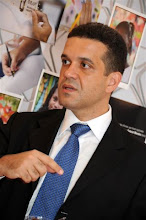- Back to Home »
- Brazilian Voting Machines
 The interaction between the evolution of technology and the development of economy and society has always been an important dimension of human history. This applies to the Iron and Bronze Ages as well as to modern times. The transition from the agricultural society towards the industrial society provides the most pertinent illustration of the profound implications which the full diffusion of new technologies can have on family structures, work relations, settlement patterns, economic and political power configurations, and also on behaviour patterns and value systems. The relationship between technology on the one hand and economy and society on the other is not uni-directional. Not only does technological progress result in the continuous change of economic and social structures, but the latter, including the evolution of attitudes and values, has at the same time a major impact on the direction and the speed of technology development. The industrial society of today, characterised by mass production, mass consumption and mass government, is in many ways a complex incarnation of the technologies of the 20th century. But there is no doubt that the profound change in political, economic and social structures has provided the conditions to enable the transition to a new paradigm.
The interaction between the evolution of technology and the development of economy and society has always been an important dimension of human history. This applies to the Iron and Bronze Ages as well as to modern times. The transition from the agricultural society towards the industrial society provides the most pertinent illustration of the profound implications which the full diffusion of new technologies can have on family structures, work relations, settlement patterns, economic and political power configurations, and also on behaviour patterns and value systems. The relationship between technology on the one hand and economy and society on the other is not uni-directional. Not only does technological progress result in the continuous change of economic and social structures, but the latter, including the evolution of attitudes and values, has at the same time a major impact on the direction and the speed of technology development. The industrial society of today, characterised by mass production, mass consumption and mass government, is in many ways a complex incarnation of the technologies of the 20th century. But there is no doubt that the profound change in political, economic and social structures has provided the conditions to enable the transition to a new paradigm.
Brazil was the first country in the world to have fully electronic democratic elections. The Brazilian voting machines were firstly developed in 1996 by a Brazilian partnership formed by three companies Samurai (formely known as OMNITECH), Microbase and Unisys do Brasil attending the TSE RFP for the Brazilian Elections in 1996. This machine was an IBM PC 80386 compatible adapted to perform as a voting machine, and was known as UE96. In 1998, Procomp, Microbase and Samurai teamed up to produce UE98. Again in 2000, Microbase and Procomp developed UE2000 together. In 2000 Brazil achieved the first completely automated election. Every voter in Brazil used the electronic system to vote.
The Brazilian voting machines were firstly developed in 1996 by a Brazilian partnership formed by three companies Samurai (formely known as OMNITECH), Microbase and Unisys do Brasil attending the TSE RFP for the Brazilian Elections in 1996. This machine was an IBM PC 80386 compatible adapted to perform as a voting machine, and was known as UE96. In 1998, Procomp, Microbase and Samurai teamed up to produce UE98. Again in 2000, Microbase and Procomp developed UE2000 together. In 2000 Brazil achieved the first completely automated election. Every voter in Brazil used the electronic system to vote.
The original operating system was VirtuOS developed and copyrighted by Microbase. It was used in 1996, 1998 and 2000. In 2002, Unisys was incapable to set a patnership with Microbase, and Microsoft provided the Windows CE operating system free of charge. In 2004, Procomp decided to migrate to Linux as a cost reduction measure.
The chief goal of the Brazilian voting machine is its extreme simplicity, attempting to be as straightforward as a public phone booth.
Electronic voting was introduced to Brazil in 1996 (when the first tests were carried in the state of Santa Catarina, Brazil. Since 2000, all Brazilian elections have been fully electronic.
News indicate that Paraguay, Argentina, Mexico, and other countries where corruption and election fraud are not just abstract concepts, may soon borrow or rent Brazil's system. Brazil lends the machines to other countries for elections as well. They have been used in Paraguay and Ecuador and there are plans to export the patented machines.
SAMURAI
Telephone: (+5511) 50973014
Site: www.samurai.com.br












